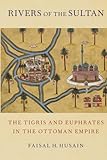Rivers of the Sultan : the Tigris and Euphrates in the Ottoman Empire / Faisal H. Husain.
Material type: TextPublisher: New York : Oxford University Press, 2021Description: pages cmContent type: text Media type: unmediated Carrier type: volumeISBN: 9780197547274Subject(s): Water-supply -- Political aspects -- Euphrates River Watershed | Water-supply -- Political aspects -- Tigris River Watershed | Water resources development -- Political aspects -- Euphrates River Watershed | Water resources development -- Political aspects -- Tigris River Watershed | Turkey -- History -- 1683-1829 | Turkey -- Foreign relations -- Iraq | Iraq -- Foreign relations -- TurkeyAdditional physical formats: Online version:: Rivers of the SultanDDC classification: 333.91/6209560903 LOC classification: HD1691 | .H87 2021Summary: "Rivers of the Sultan offers a history of the Ottoman Empire's management of the Tigris and Euphrates rivers in the early modern period. During the early sixteenth century, a radical political realignment in West Asia placed the reins of the Tigris and Euphrates in the hands of Istanbul. The political unification of the longest rivers in West Asia allowed the Ottoman state to rebalance the natural resource disparity along its eastern frontier. It regularly organized the shipment of grain, metal, and timber from upstream areas of surplus in Anatolia and the Jazira to downstream areas of need in Iraq. This imperial system of waterborne communication, the book argues, created heavily militarized fortresses that anchored the Ottoman presence in Iraq, enabling Istanbul to hold in check foreign and domestic challenges to its authority and to exploit the organic wealth of the Tigris-Euphrates alluvium. From the end of the seventeenth century, the convergence of natural and human disasters transformed the Ottoman Empire's relationship with its twin rivers. A trend toward provincial autonomy ensued that would localize the Ottoman management of the Tigris and Euphrates and shift its command post from Istanbul to the provinces. By placing a river system at the center of analysis, this book reveals intimate bonds between valley and mountain, water and power in the early modern world"-- Provided by publisher.
TextPublisher: New York : Oxford University Press, 2021Description: pages cmContent type: text Media type: unmediated Carrier type: volumeISBN: 9780197547274Subject(s): Water-supply -- Political aspects -- Euphrates River Watershed | Water-supply -- Political aspects -- Tigris River Watershed | Water resources development -- Political aspects -- Euphrates River Watershed | Water resources development -- Political aspects -- Tigris River Watershed | Turkey -- History -- 1683-1829 | Turkey -- Foreign relations -- Iraq | Iraq -- Foreign relations -- TurkeyAdditional physical formats: Online version:: Rivers of the SultanDDC classification: 333.91/6209560903 LOC classification: HD1691 | .H87 2021Summary: "Rivers of the Sultan offers a history of the Ottoman Empire's management of the Tigris and Euphrates rivers in the early modern period. During the early sixteenth century, a radical political realignment in West Asia placed the reins of the Tigris and Euphrates in the hands of Istanbul. The political unification of the longest rivers in West Asia allowed the Ottoman state to rebalance the natural resource disparity along its eastern frontier. It regularly organized the shipment of grain, metal, and timber from upstream areas of surplus in Anatolia and the Jazira to downstream areas of need in Iraq. This imperial system of waterborne communication, the book argues, created heavily militarized fortresses that anchored the Ottoman presence in Iraq, enabling Istanbul to hold in check foreign and domestic challenges to its authority and to exploit the organic wealth of the Tigris-Euphrates alluvium. From the end of the seventeenth century, the convergence of natural and human disasters transformed the Ottoman Empire's relationship with its twin rivers. A trend toward provincial autonomy ensued that would localize the Ottoman management of the Tigris and Euphrates and shift its command post from Istanbul to the provinces. By placing a river system at the center of analysis, this book reveals intimate bonds between valley and mountain, water and power in the early modern world"-- Provided by publisher.
| Item type | Current library | Call number | Status | Date due | Barcode |
|---|---|---|---|---|---|
 Books
Books
|
The BIAA David H. French Library Shelf 62 - Reading Room | H2n HUSAI 33266 | Not for loan | BOOKS-000000027382 |
Includes bibliographical references and index.
"Rivers of the Sultan offers a history of the Ottoman Empire's management of the Tigris and Euphrates rivers in the early modern period. During the early sixteenth century, a radical political realignment in West Asia placed the reins of the Tigris and Euphrates in the hands of Istanbul. The political unification of the longest rivers in West Asia allowed the Ottoman state to rebalance the natural resource disparity along its eastern frontier. It regularly organized the shipment of grain, metal, and timber from upstream areas of surplus in Anatolia and the Jazira to downstream areas of need in Iraq. This imperial system of waterborne communication, the book argues, created heavily militarized fortresses that anchored the Ottoman presence in Iraq, enabling Istanbul to hold in check foreign and domestic challenges to its authority and to exploit the organic wealth of the Tigris-Euphrates alluvium. From the end of the seventeenth century, the convergence of natural and human disasters transformed the Ottoman Empire's relationship with its twin rivers. A trend toward provincial autonomy ensued that would localize the Ottoman management of the Tigris and Euphrates and shift its command post from Istanbul to the provinces. By placing a river system at the center of analysis, this book reveals intimate bonds between valley and mountain, water and power in the early modern world"-- Provided by publisher.
